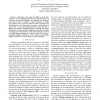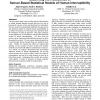501 search results - page 69 / 101 » A Social Action Model of Situated Information Systems Design |
ICRA
2007
IEEE
14 years 3 months ago
2007
IEEE
— Ubiquitous robots need the ability to adapt their behaviour to the changing situations and demands they will encounter during their lifetimes. In particular, non-technical user...
APGV
2006
ACM
14 years 2 months ago
2006
ACM
Understanding the robustness and rapidness of human scene categorization has been a focus of investigation in the cognitive sciences over the last decades. At the same time, progr...
ABIALS
2008
Springer
14 years 3 months ago
2008
Springer
Abstract— Starting from the situated and embodied perspective on the study of biological cognition as a source of inspiration, this paper programmatically outlines a path towards...
CHI
2004
ACM
14 years 9 months ago
2004
ACM
Current systems often create socially awkward interruptions or unduly demand attention because they have no way of knowing if a person is busy and should not be interrupted. Previ...
HT
2004
ACM
14 years 2 months ago
2004
ACM
Adaptive hypermedia has the goal of contextualizing the display of a hypertext to suit the user and their situation. A variety of aspects of the context can influence the appropri...


